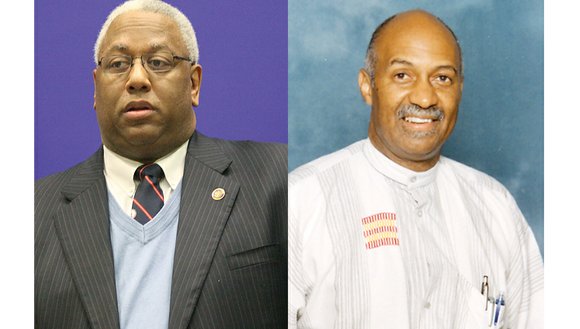SCLC Empowerment Conference sends message of collective change
Joey Matthews | 12/11/2015, 6:43 a.m.
Educate yourselves about issues of importance to the African-American community.
Engage both individually and collectively with legislators in the General Assembly via emails, letters and phone calls.
And go to the State Capitol in person to voice your concerns.
Those are three ways to help effect change in the community, state Sen. A. Donald McEachin of the 9th District told audience members Saturday at the first annual Empowerment Conference at Wesley Memorial United Methodist Church in the East End.
“It’s important to get involved and stay involved,” said Sen. McEachin, who is chairman of the Senate Democratic Caucus.
About 30 human rights advocates, faith leaders, nonprofit organization members, public housing leaders and others attended the conference organized by the Richmond Chapter of the Southern Christian Leadership Conference.
The event was designed to discuss legislative issues prior to the start of the General Assembly in January, said the Rev. Rodney Hunter, president of the Richmond SCLC chapter and pastor at Wesley Memorial.
Rev. Hunter spoke of efforts to “turn back the clock” on civil rights gains through means such as voter suppression laws, attacks on affirmative action and disparities in the criminal justice system.
“It’s pushed back because we’re passive and we let it happen,” he told attendees. “We need to unite and work together to make sure that doesn’t happen. This is just the beginning,” he promised of the empowerment effort.
Patricia Williford, president of the Mosby Court Tenants Council, said she attended the conference because “I’m very interested in the different partners that are here today that maybe could help bring resources to our community.”
In his 20-minute address, Sen. McEachin said Democrats would continue to advocate for an increase in the minimum wage and affordable housing, union rights, criminal justice reforms and reasonable laws to restrict access to guns.
He lamented the state law that makes the theft of anything valued at more than $200 a felony. He said the felony classification has presented an obstacle to jobs, affordable housing and voting rights for many African-Americans.
Some Republican legislators have realized that the cost to incarcerate nonviolent offenders costs a lot of money “and is a budget buster,” Sen. McEachin said.
“If that’s what it takes for them to join our efforts to change the law, I’ll ride that wave,” he said.
Adding its backing to the effort to change the $200 felony grand larceny threshold, the Virginia State NAACP issued a statement Tuesday to “demand passage of legislation that substantially increases” the threshold “up to $1,500.”
The statement, which contained the support of about a dozen other human rights groups, called on the General Assembly, Gov. Terry McAuliffe and the Virginia Retail Merchants Association to support the threshold increase.
Mike Wilson of the United Food and Commercial Workers International Union Local 400 that represents workers at such local businesses as Kroger grocery stores and Tyson Foods, told the audience unions are important because they protect workers’ rights, negotiate fair wages and ensure job security.
Jesse Frierson, executive director of the Virginia Alliance Against Mass Incarceration, said it’s time for the black community to rely on its “people resources” to bring an end to the discriminatory criminal justice system.
“We’ve being crushed while we’re singing ‘Kumbaya’ and playing Tiddlywinks,” he said.
“We ride or we die,” he said of the imperative of uniting to battle injustice.
He blasted the Retail Merchants Association, which he said recently backed keeping the state threshold for felony theft at $200.
“All these folks we patronize every day are opposed” to changing the law, Mr. Frierson said.
King Salim Khalfani, a consultant and former executive director of the Virginia State NAACP, decried policies in government and the corporate world that ensure “one-tenth of 1 percent control the money and the means” and deprive Africans-Americans of a fair share of the economic pie. He echoed the call for people to unite for positive change in the community.
“If it is to be, it’s up to we,” he said.
“Unless we say, ‘We’ve had enough,’ things will never change,” he said.
Others at the conference called for better treatment of military veterans, more services to assist homeless people and access to health care for all.







